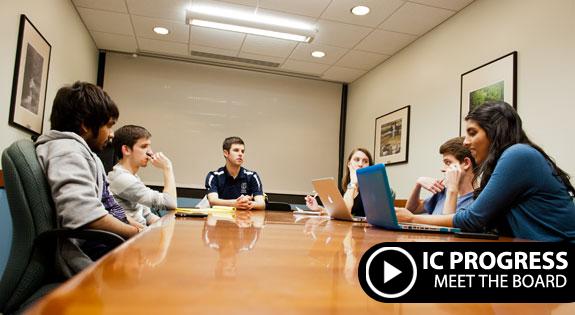
The Student Government Association’s newly elected leaders, IC Progress, plan to implement changes in structure, transparency and campus events next year.
IC Progress, led by junior Rob Flaherty, won last week’s election over Be Heard, the opposing group led by junior Ellis Williams. The group will take over for the current board, The Constructionists, in the fall.
The Constructionists, who are finishing up their year, said they accomplished most of their initial goals, including establishing the first Spirit Week, making student senators more accessible and creating a program to raise money for students in financial need to pay for college tuition. Senior Scott Nachlis, the current SGA president, said his board was successful in completing their platform goals and added a few along the way.
“We added an international senator,” Nachlis said. “We completely revamped that elections act. We endorsed a no-fracking policy, we endorsed the Asian-American Studies minor.”
Members of IC Progress plan to focus on three main initiatives: restructuring SGA by eliminating a standing committee called the campus affairs committee, focusing on transparency to its constituents and planning more community-inclusive events.
“The idea is that our senate will be structured more based on tasks and progress and results, and less on sort of process procedure,” Flaherty said. “We want to make it much more streamlined.”
Elections for SGA were held last week from April 2 to 4 with the two competing boards, IC Progress and Be Heard.
Though the number of student votes increased from last year, the turnout was 16.7 percent of the undergraduate student body. This year, 1,050 students submitted their vote, compared to last year’s turnout of 1,001, which accounted for about 16.3 percent of the student body.
Sophomore Robert Hohn, vice president of business and finance, said the group will place an emphasis on engaging the campus community.
“We want to engage the student body and make sure that we understand what they need and what they see is wrong with the campus,” he said.
IC Progress’ executive board includes freshman Isuru Somasinghe, vice president of academics; Ayesha Patel, vice president of campus affairs; sophomores Hohn, vice president of business and finance; Courtney Brown, vice president of communications; and Justin Pyron, vice president of Senate affairs.
“Both parties had a really interesting and excellent platform,” Flaherty said. “The themes of engaging with the student body, advocating for student interests and reforming are what we want to do here. I think that both parties had a great message, and I was heartened, really, by the level passion on both sides.”
This year’s votes were tallied on IC Link, a social site for student organization involvement on campus, as opposed to other years when votes were processed through the site SurveyMonkey or emailed to board members to be totaled.
Though Williams did not secure a win for Be Heard, he said he still plans to stay involved with the SGA community.
“There is a responsibility we have as people who want to be involved to not leave when it gets hard, but to go back and find new ways to get that word out and reintroduce that word.” Williams said. “I don’t think it should stop with a loss, I think it should continue with a loss.”
This year, both parties presented platforms to reach out to the student body. IC Progress’ platform was broken into three parts: engage, advocate and reform.
The Be Heard campaign was also broken into three parts, including active presence on campus for the student body and the senate, support for campus life and access to transportation.
Transparency is a key goal of IC Progress this coming academic year, Flaherty said, which can be better achieved by changing meeting locations to more popular spots on campus.
“I want to make it way easy for students to follow what is going on in SGA because it is hard to see what we are doing and when we are doing things,” he said. “I really want to take our meetings all across
campus — I want these meetings not on the third floor, hidden away.”
IC Progress plans to start the year off strong by setting a good tone.
“We are going to do that by having a couple of big events right at the beginning of next year,” Flaherty said.
New events include a plan for having fireworks, followed by a dance the night before classes begin, as well as a student organization fair on the quad where organizations will have room to set up large displays and get more creative with how they try to get students to take an interest in their organizations.
All of the new board members have been involved with SGA previously.
“All of us are already in SGA, and we’re really heavily involved in SGA, and some people thought of that as a bad thing, like it’s just going to be like this year again and nothing’s going to change, but we believe that because of our experience we know things that could be improved,” Patel said. “We are at meetings every week … so we know the issues and what we want to fix and know the most efficient way to fix it.”
Nachlis said he is confident in IC Progress’ ability to lead the Student Government Association next year because of the board’s breadth of new ideas.
“This year was a lot of pilot programs — with the new legislation policy, with doing budget this spring semester a little bit differently — so next year it’ll be on Rob and his e-board to kind of evaluate how things worked this year, how things didn’t work and just kind of move the organization along,” he said.
Flaherty said the primary focus of IC Progress is to keep the student body engaged.
“My main focus is making sure that students at Ithaca College have the best experience that they can have and are in an inclusive and involved community,” he said.







